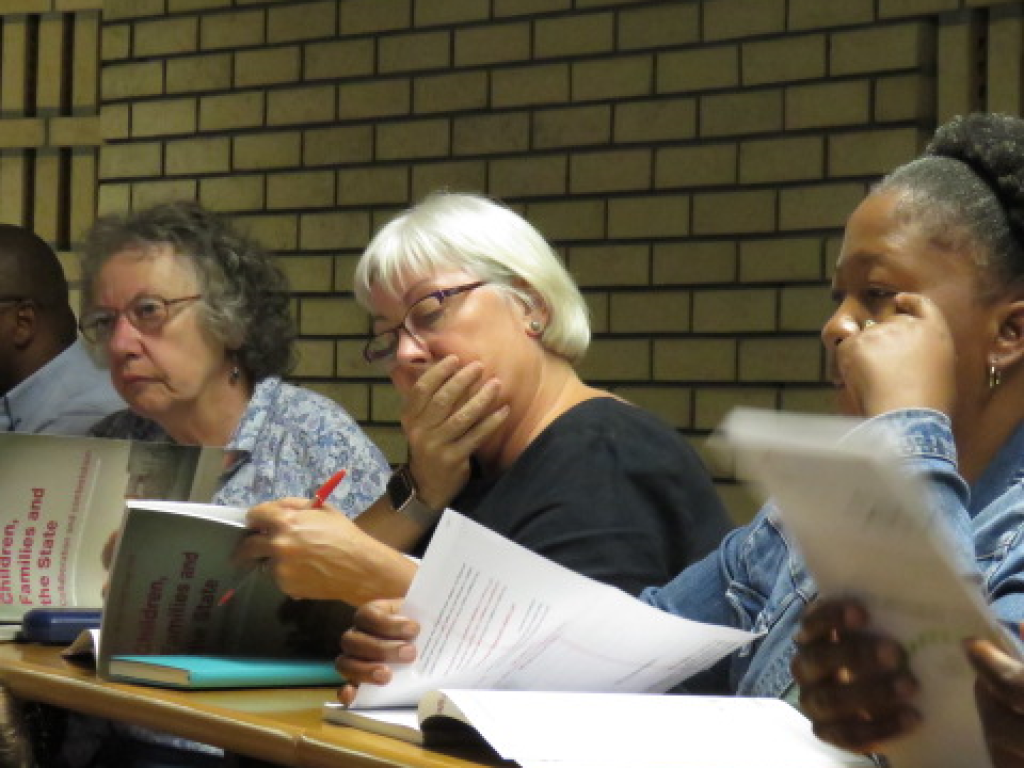Children, families and the state: A call for targeted and responsive policies

The Children’s Institute, University of Cape Town, presented on the South African Child Gauge 2018 at the Poverty & Inequality Initiative’s monthly seminar series on 5 February 2019. The seminar, which was co-hosted by the Southern Africa Labour and Development Research Unit (SALDRU), served as the Cape Town launch of the 13th issue of this annual review of the situation of South Africa’s children. More than 100 stakeholders from civil society, academia and provincial and local government attended the event to engage in robust discussion.
Each year, the publication focuses on a major challenge affecting children’s well-being and critically analyses the position of children and the policy responses required. The latest publication is the largest to date and focuses attention on the partnership between families and the state as they collaborate to ensure the survival and development of children.
“The annual publication of the South African Child Gauge is an important event for anyone doing research, making policy for the engagement and practice that concern children in this country,” said Shirley Pendlebury, former director of the Children’s Institute and emeritus professor in the Department of Education at UCT, who chaired the seminar.
The event drew practitioners from a myriad of disciplines, all who use the publication as a tool to communicate the latest evidence to their respective fields. This multi-disciplinary approach to research is what makes the Child Gauge invaluable especially when analysing the fluid and diverse nature of families and the strategies they employ to care for their children.
“We’re looking at families and the state as essential development partners that collaborate for the survival and development of children. A partnership that requires a constant collaboration. The state needs families to reproduce the population and to nurture children and provide for their needs. This in turn builds the capacity of the state. We need to see families as an important resource not a liability,” said Dr. Katharine Hall, lead editor of the Child Gauge 2018 and senior researcher at the Children’s Institute.
“Through the efforts care and support of families children grow and develop. They are the next generation of scholars and teachers, nurses, politicians, business people and parents. Taking this long view is important because it reminds us that no matter how much effort is spent in getting policies and services right in whatever sector, it is ultimately people that they aim to serve and many of those people are young or not yet born,” she added.
Dr. Elena Moore, Child Gauge author and currently acting as the DST-NRF Chair in Customary Law, Human Rights and Indigenous Values, also presented her research on the intricacies of living customary law and the challenges the state faces when trying to regulate family relationships.
“Given that families in South Africa operate within this complex plural legal system, the question is more about what is the best use or misuse of state powers,” she said.
Moore also emphasised the need for more researchers in the field of living customary law in order to determine, for example, how practices like lobola vary from region to region.
“We need a cohort of mainly Black South African scholars who speak the local language, who know particular cultures, who are on the ground influencing policy and law. No researcher can do that alone and we wouldn’t want them to,” she added.
Nonzuzo Mbokazi, a PhD student in the Department of Sociology at UCT has risen to that challenge. Mbokazi shared the unique ways in which she drew on research from the current Child Gauge to inform her thesis titled ‘Understanding low-income working mothers and child-care policy’.
“The contestation of cultural practices is not one I anticipated arising from my research. Yet it became very difficult to speak about childcare without looking at paternal kin involvement. The Child Gauge 2018 was very useful in helping frame my research because it helped me think through the cultural implications of who cares for children,” she said.
The continued success and impact of the Child Gauge spans more than a decade thanks to the support of Children’s Institute partners such as the ELMA Foundation, the DST-NRF Centre for Excellence in Human Development at the University of the Witwatersrand, UNICEF South Africa, Standard Bank Tutuwa Community Foundation and the stalwart support of the University of Cape Town. The university’s ongoing collaboration with the Children’s Institute to produce the Child Gauge as a key communication and advocacy tool continues to make academic research accessible to a wider audience.
More about the South African Child Gauge series.
Article by Margot Cornelius, CI communications officer, February 2019.